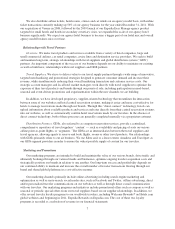Expedia 2011 Annual Report Download - page 21
Download and view the complete annual report
Please find page 21 of the 2011 Expedia annual report below. You can navigate through the pages in the report by either clicking on the pages listed below, or by using the keyword search tool below to find specific information within the annual report.assurance that sufficient financing will be available on desirable or even any terms to fund investments,
acquisitions, stock repurchases, dividends, debt refinancing or extraordinary actions or that our counterparties in
any such financings would honor their contractual commitments. In addition, any downgrade of our debt ratings
by Standard & Poor’s, Moody’s Investor Service or similar ratings agencies, increases in general interest rate
levels and credit spreads or overall weakening in the credit markets could increase our cost of capital.
Changing laws, rules and regulations and legal uncertainties may adversely affect our business or
financial performance.
Our business and financial performance could be adversely affected by unfavorable changes in or
interpretations of existing laws, rules and regulations or the promulgation of new laws, rules and regulations
applicable to us and our businesses, including those relating to the internet and online commerce, internet
advertising, consumer protection and privacy. Unfavorable changes could decrease demand for products and
services, limit marketing methods and capabilities, increase costs and/or subject us to additional liabilities.
For example, there is, and will likely continue to be, an increasing number of laws and regulations
pertaining to the internet and online commerce that may relate to liability for information retrieved from or
transmitted over the internet, online editorial and user-generated content, user privacy, behavioral targeting and
online advertising, taxation, liability for third-party activities and the quality of products and services.
Furthermore, the growth and development of online commerce may prompt calls for more stringent consumer
protection laws and more aggressive enforcement efforts, which may impose additional burdens on online
businesses generally. In addition, the promulgation of new laws, rules and regulations that restrict or otherwise
unfavorably impact the ability or manner in which we provide primary ticketing and ticket resale services would
require us to change certain aspects of our business, operations and client relationships to ensure compliance,
which could decrease demand for services, reduce revenues, increase costs and/or subject the company to
additional liabilities.
Adverse application of existing tax or unclaimed property laws, rules or regulations or
implementation of new unfavorable laws, rules or regulations, could have an adverse effect on our business
and financial performance.
The application of various domestic and international sales, use, occupancy, value-added, payroll and other
tax or unclaimed property laws, rules and regulations to our historical and new products and services is subject to
interpretation by the applicable authorities. Many of the fundamental statutes and regulations that impose these
taxes and other obligations were established before the growth of the internet and e-commerce. If the tax or other
laws, rules and regulations were amended, if new unfavorable laws, rules or regulations were adopted, as has
recently occurred in certain jurisdictions, or if current laws are interpreted adversely to our interests, particularly
with respect to occupancy or value-added taxes or unclaimed property, the results could increase our tax
payments or other obligations (prospectively or retrospectively) and/or subject us to interest and/or penalties and
decrease the demand for our products and services if we pass on such costs to the consumer. As a result, these
changes could have an adverse affect on our businesses or financial performance.
A number of authorities have brought lawsuits and have levied assessments asserting that we are required to
collect and remit hotel occupancy taxes. In addition, we have in the past and may in the future be required in
certain jurisdictions to pay tax assessments, which may be substantial, prior to contesting the validity of such
assessments. This requirement is commonly referred to as “pay-to-play.” Payment of these amounts is not an
admission that the taxpayer believes it is subject to such taxes. We continue to work with relevant tax authorities
and legislators to clarify our obligations under existing, new and emerging laws and regulations.
Our failure to comply with existing laws, rules and regulations could adversely affect our business,
financial condition and results of operations.
Since our businesses sell airline tickets and provide related services to consumers through a number of
different online and offline channels, these businesses are subject to a wide variety of statutes, rules, regulations,
17
























